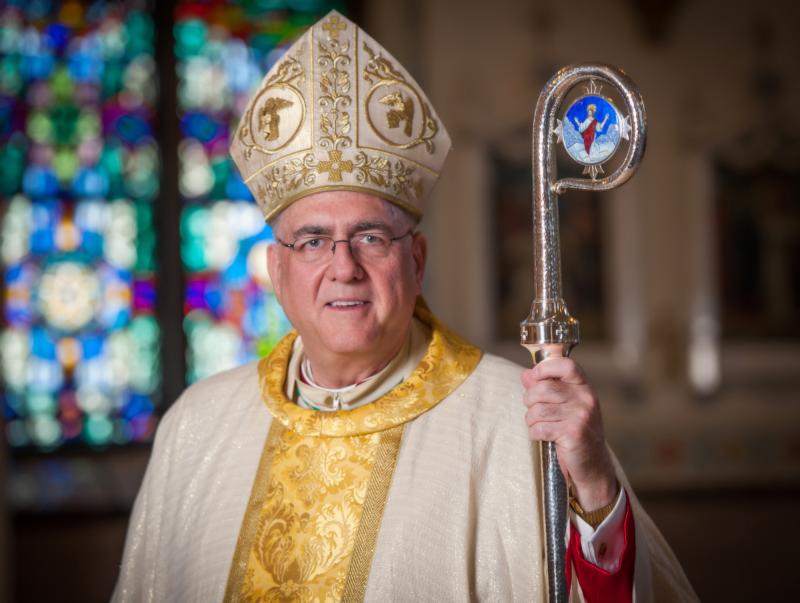
by Archbishop Joseph F. Naumann
Two weeks ago in response to an invitation from chaplain Father Joseph Chontos, and accompanied by the Little Sisters and Little Brothers of the Lamb, I visited the Kansas Juvenile Correctional Complex in Topeka.
This was my seventh visit to the juvenile correction center and, each time, I am troubled by the stark reality of teenagers in a prison. One of the young men was celebrating his 14th birthday.
The Little Sisters and the Little Brothers, as well as some young adult friends of the community, performed an original play on the life of St. Francis.
Little Sister Sarai, the creative genius and author of the play, chose St. Francis as the subject for this theatrical production because it was Francis who first fostered devotion to the Christmas creche, depictions of the humble circumstances of Our Lord’s birth.
The play opened with a scene in the latter part of Francis’ life when a friar asked the future saint why God had chosen him to create this movement that was changing not only the church but the broader society and culture. After reflecting on the question, Francis proposed that God had chosen him because in his youth he had been a great sinner.
The play then flashes back to the life of Francis before his conversion. In his young adulthood, Francis was known for his extravagant taste and being considered the life of the party.
Through God’s amazing grace, Francis learns to detach himself from those things he formerly considered so important for his happiness — fine food, fashionable clothing and being well regarded by his peers.
At the same time, Francis began to discover joy in what he had formerly feared and even despised: association with the poor, the vulnerable and the seriously sick.
After the play was over, I spoke briefly with the young people about Jesus and the meaning of Christmas. I reminded them for the Christian, even in prison, we are still free. Not free in the sense that our culture thinks of freedom, namely: to do whatever I want, when I want, as long as it does not hurt anyone else too badly.
For the Christian, freedom is the ability to choose to love God, to love others, to do good, to do that which is noble. There is no circumstance in which we cannot exercise Christian freedom, even in prison.
I encouraged the young people to exercise this Christian freedom even while living in the Juvenile Correctional Complex. They were still free to love God and draw closer to him in prayer. They were free to seek the good of each other and to care about each other.
Jesus came to free us not from physical imprisonment but from our enslavements, our attachments to the things and pleasures of this world. Jesus shows us that we do not need material things to have joy.
We do not have to pursue more intense pleasures to experience the happiness Jesus promised to his disciples. In reality, the attachments to material things or pleasures actually rob us of our capacity for joy. This is what St. Francis discovered as a young man.
Afterwards, we had the chance to have informal conversations with the young residents of the correction center. One young man asked the young adult, who played the role of St. Francis in the play: Was it true that Jesus came for him and the other young people in the correction center?
He wanted to know if it was true that Jesus had a special love for him and his fellow inmates. The star of the play was able to assure this juvenile offender that Jesus came particularly for him and his fellow inmates.
The question of this incarcerated teenager revealed he truly understood the meaning of the play he had just seen. God used Francis to do amazing things — not because of his strength, but because of his weakness.
With God, the important thing is not that we have never sinned, but that we are opened to his mercy and grace to change and be transformed. St. Paul reminds us that God likes to choose as his special emissaries the lowly and the weak — those who in the world’s eyes count for nothing.
Please pray for the young people at the Kansas Juvenile Correctional Complex. Pray that their hearts might remain open to know Jesus and to experience his mercy and love.
There are many examples of individuals who were able to come to know God and to experience his mercy in a powerful way while in prison.
Pray for Father Chontos and all those who attempt to care for these young people at this very important time in their lives. May their time at the correction center not be a time when their hearts become more hardened, but a time when they experience the depth of God’s love for them revealed in the Child born in Bethlehem and who died as a criminal on Calvary.
Pray that they may know the joy and freedom Our Lord can provide for us, no matter the external circumstances of our lives. Pray that they might be set free by experiencing the liberating mercy and love of God.
The young people at the Juvenile Correctional Complex in Topeka have one potential advantage. Their circumstances make it clear that they need a Redeemer and Savior. Unless we realize, like St. Francis, our own sinfulness, then the birth of Jesus in Bethlehem 2,000 years ago has no importance for us.
Unless we realize that our enslavements to material things or fleeting pleasures create a much more confining prison than one built of concrete and barbed wire, we have no need for the One born in Bethlehem.


